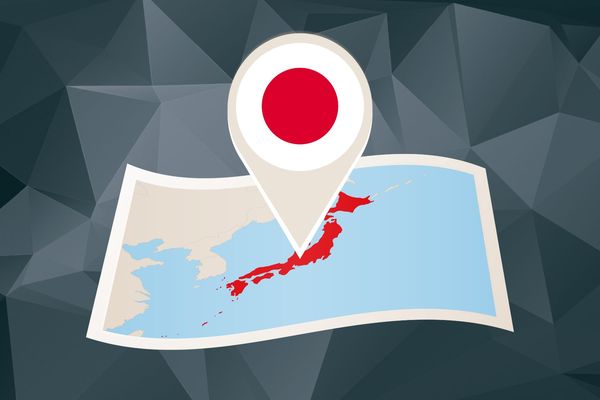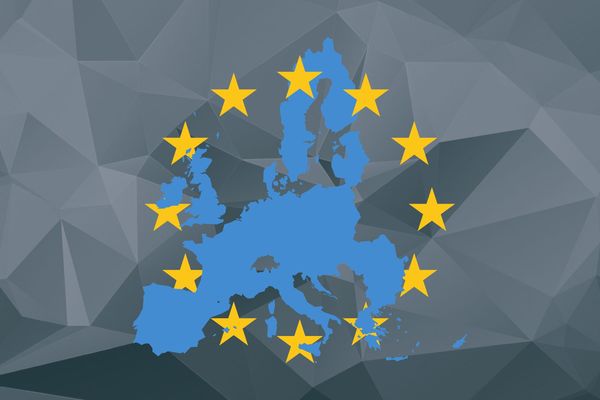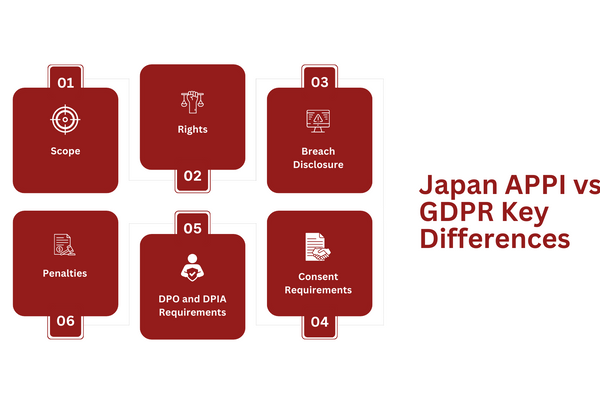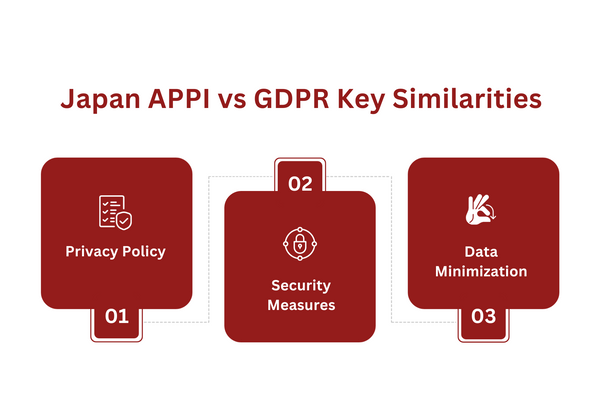
Do you want to know the difference between Japan’s APPI and the EU’s GDPR? These are two major regulations that play a big role in managing data across Japan and the EU.
This article dives into the details of Japan’s APPI and the EU’s GDPR. We’ll explore how these rules affect handling personal data and their impact on businesses. This is a complete guide to help you understand the tricky world of data protection laws.
Let’s get started.
Key Takeaways
Japan’s APPI and the EU’s GDPR are quite different in how wide they reach and what they ask for in terms of consent. The GDPR covers more ground and has tougher rules about asking for permission to use personal data.
Both these laws take data safety seriously. However, the GDPR is stricter about telling people when data leaks happen and can fine more if rules are broken. This shows how serious the GDPR is about keeping data safe.
Even though APPI and GDPR are different, they both agree on two big things. They say you need to be transparent about privacy and have reasonable ways to keep data safe. This shows how important it is for everyone to be clear about how they use data and to protect it well.
What is Japan’s APPI?
What is Japan’s APPI.jpg

The APPI first came around in 2003, but it gets a check-up every three years to make sure it’s still relevant with the evolving technology. For instance, in 2017, they made a change to protect a special kind of data even more.
And in 2020, they made some big updates that started in April 2022. These changes made the law more stringent about consent when data is shared outside Japan and added rules about data breaches.
The APPI is mostly about businesses that have citizen’s personal information in Japan. It doesn’t matter if the business is located in Japan or somewhere else – if they’ve got data on Japanese citizens, they must follow the rules. This includes how they gather, store, and share personal information.
Japan’s APPI focuses on making sure businesses keep data secure and tell people how they’re using their data rather than asking for permission upfront. If something goes wrong, like a data breach, the law puts more emphasis on fixing the problem than punishing the business.
But if a business doesn’t follow the rules after being told to, there can be fines or even jail time.
Key Points for Businesses
Only Collect Necessary Data: Collect data strictly for defined purposes. Avoid unnecessary data accumulation.
Delete Unnecessary Information: Regularly review and delete data that no longer serves its initial purpose.
Ensure Data Accuracy: Actively maintain the accuracy and relevance of personal data.
Appropriate Measures to Prevent Breaches: Implement robust security protocols to safeguard data against breaches.
Setup Consent Mechanisms: Establish clear consent mechanisms, especially for sensitive data like health or financial information.
Ensure Consent for Data Transfers: Obtain explicit consent for data transfers, except in cases of public interest.
Report Data Breaches Promptly: In case of a data breach, promptly notify affected individuals and relevant authorities.
Ensure a Clear Privacy Notice: Provide a transparent and accessible privacy notice detailing data use, rights, and protections.
What is EU GDPR?
What is EU GDPR.jpg

The EU’s GDPR, which started on May 25, 2018, has really set the bar high for protecting people’s digital privacy across all EU countries. It’s essentially a guide for data privacy, a handbook for any business on handling the personal info of EU residents.
The GDPR is recognized for establishing seven fundamental GDPR principles, which guide how businesses should manage personal data. These principles are:
Lawfulness, Fairness, and Transparency: Data processing must be lawful, fair, and transparent to the data subject, ensuring that personal data is handled in a way that is justifiable and clear to the individuals it concerns.
Purpose Limitation: Personal data must be collected for specified, explicit, and legitimate purposes and not further processed in a manner that is incompatible with those purposes.
Data Minimization: Only the minimum amount of personal data required for the intended purpose should be collected and processed, ensuring no excess data is used.
Accuracy: Personal data needs to be correct and up-to-date. If it’s wrong, it should be fixed or deleted quickly.
Storage Limitation: Personal data shouldn’t be kept longer than needed. Businesses should set time limits for how long they keep data or regularly check if they still need it
Integrity and Confidentiality (Security): Personal data must be kept safe. This includes protecting it from unauthorized use or accidental loss or damage and using good security measures.
Accountability: The data controller is responsible for and must be able to demonstrate compliance with the other GDPR principles, ensuring accountability for data processing activities.
These principles form the core of GDPR, dictating the lawful basis for processing personal data and ensuring the protection of EU residents’ privacy rights.
The GDPR really focuses on keeping people’s personal information safe. This includes things like your name, phone number, and address – basically, anything that can identify you.
There’s extra care for sensitive info like health records, political opinions, and religious beliefs. The GDPR rules are stricter for this kind of data, like requiring data protection impact assessments (DPIAs) and even an assigned data protection officer (DPO).
When this data is shared with others or sent to different countries, it has to follow strict data transfer GDPR rules as well.
The GDPR applies to any business, no matter the size. If you sell things or provide services to people in the EU or keep an eye on what they do, you’re under it’s jurisdiction. This means even a small online store outside Europe must follow GDPR if they have consumers in the EU.
Key Points for Businesses
Privacy Policy: In your privacy policy, make sure to explain clearly how you use people’s data. This should include how you handle the data, how long you keep it, and what rights people have over their data.
Consent: Always get clear permission when you use someone’s data. Make sure the person really understands and agrees with how their data will be used.
Data Breach Notifications: Promptly inform authorities and affected individuals in case of data breaches, especially if there’s a risk to their rights and freedoms.
Data Protection Officer: Choose a Data Protection Officer (DPO) to make sure your business follows GDPR rules. This is really important if your business deals with a lot of sensitive data or is a public authority.
Data Security: Put strong security measures in place to keep personal data safe from unauthorized access or leaks. This includes using encryption, training your employees regularly, and conducting regular DPIAs.
Japan APPI vs GDPR Key Differences
Japan APPI vs GDPR Key Differences.png

Understanding the key differences between Japan’s Act on the Protection of Personal Information (APPI) and the European Union’s General Data Protection Regulation (GDPR) is crucial for businesses.
These differences highlight the unique approaches each regulation takes in protecting personal data.
Scope
Japan’s APPI is designed to regulate the handling of personal information by businesses. It encompasses a broad range of data management practices, covering both paper-based and digital information.
The APPI sets standards for how businesses should manage personal data, emphasizing the importance of security and responsible data handling.
The GDPR in Europe, however, has a wider reach. It applies to any business that uses the personal data of people living in the EU, no matter where the business is. This means GDPR covers more types of data and affects more businesses globally.
Rights
The Usercentrics article on Japan’s Act on the Protection of Personal Information (APPI) provides a comprehensive overview of the rights and obligations under this law. Here are the key points regarding the personal rights under APPI:
Right to Access Data: Data subjects have the right to see the personal information that is kept by those who control this data (called PICs). This right includes seeing records of their data being shared with others, but not if the data is changed to hide their identity. Sometimes, they might not be allowed to see their data if it could cause safety issues or really mess up the PIC’s work.
Right to Revision and Deletion: Individuals can request the revision, correction, amendment, or deletion of their data. If a request for revision isn’t addressed within two weeks, it can be enforced through civil action.
Right to Cease Use of Data: Data subjects can ask the ones in charge of their personal data (called PICs) to stop using or sharing their data in certain situations. For example, if their data is being used for reasons not told to them or if it was gotten dishonestly. However, if stopping the use of their data is too hard or costs too much, the PICs might say no to this request.
These data subject rights ensure that individuals have significant control over their personal data, aligning with global trends in data protection and privacy.
The GDPR grants EU residents eight specific GDPR rights over their personal data, which are:
Right to Access: Individuals have the right to know what personal data is collected about them, the purpose of its collection, and the duration of its processing.
Right to Rectification: If personal data is inaccurate or incomplete, individuals can request corrections or updates.
Right to Erasure (Right to be Forgotten): Individuals can request the deletion of their data if it’s no longer necessary or if they withdraw consent.
Right to Restriction of Processing: Individuals can ask for a temporary halt in the processing of their data under certain circumstances.
Right to Data Portability: Individuals can request their data in a structured format and transfer it to another service provider.
Right to Object: Individuals can object to the processing of their data for direct marketing or other purposes.
Rights Related to Automated Decision-Making and Profiling: Individuals have the right not to be subject to decisions based solely on automated processing, including profiling, if it significantly affects them.
Right to Withdraw Consent: If data processing is based on consent, individuals can withdraw it at any time.
In comparison, Japan’s APPI provides several rights, but it does not encompass all the rights under the GDPR.
For instance, the APPI focuses more on the right to access, correct, and delete personal data and less on rights like data portability or objection to automated decision-making. This difference highlights the GDPR’s broader scope in empowering individuals with control over their personal data.
Breach Disclosure
In Japan, under the APPI, the rules are not very strict for data breaches. If a business has a data breach, they are told to do the right thing.
This means they should tell the Personal Information Protection Commission and the people whose data was affected. But they don’t always have to do this. A notification must only be done if it was a major breach including over 1,000 citizens or includes sensitive data.
On the other hand, the GDPR in Europe is much stricter. If a business in the EU has a data breach, it must tell the data protection authority fast, within 72 hours. They need to explain what happened, how many people are affected, and what they’re doing about it.
If the breach is really serious and could harm people’s rights, they also have to tell those people quickly. This shows that the GDPR is very serious about being open and careful when data breaches happen.
Consent Requirements
In Japan, businesses need permission to use sensitive personal information and share data across borders or with other businesses. But for regular personal data, they just need to tell people how they’ll use it.
The GDPR is stricter. It says you must get clear permission to use any personal data collected. This permission needs to be specific and given freely by the person. The GDPR makes sure people really agree with how their data is used.
DPO and DPIA Requirements
Japan’s APPI doesn’t say you must have a Data Protection Officer (DPO) or do special assessments for data protection (DPIAs). Businesses can choose to have these roles and processes, but it’s not a must.
The GDPR is different. It says some businesses must have a DPO, especially if they handle lots of sensitive data or watch what people do a lot. The GDPR also requires these businesses to do DPIAs for risky data activities. This means the GDPR is more about planning ahead and keeping data safe.
Penalties
In Japan, if a business doesn’t follow the APPI, they might have to pay a lot of money. The fine can be as much as 100 million yen, which is about $700,000.
How much they pay depends on how big the mistake was. But it’s not just about money. Sometimes, there can be criminal charges, too. This means people in the business could go to court or even to jail if they really mess up.
The GDPR in Europe is even tougher on businesses that break the rules. They can be fined up to €20 million, or 4% of their global yearly income, whichever is more. This can be a huge amount of money, especially for big businesses.
The GDPR is very serious about making sure businesses follow its rules. The big fines show that they mean business when it comes to protecting people’s data.
Japan APPI vs GDPR Key Similarities
Japan APPI vs GDPR Key Similarities.png

While Japan’s APPI and the EU’s GDPR have their differences, they also share some important similarities. These common points are key for businesses to understand, as they provide a foundation for good data protection practices, no matter where you operate.
Privacy Policy
Both Japan’s APPI and the EU’s GDPR have specific requirements for privacy policies. These policies must be clear and detailed, explaining how a business uses personal data. Here’s what should be included:
Type of Data Collected: Clearly list the kinds of personal data you’re collecting, like names, addresses, or email addresses.
Purpose of Data Collection: Explain why you’re collecting this data. For example, is it for marketing, customer service, or something else?
Data Usage: Describe how you will use the data. This could include processing orders, sending newsletters, or improving services.
Data Sharing: If you share data with other businesses or organizations, you need to say so. Explain who you’re sharing with and why.
Data Storage and Security: Tell people how you keep their data safe and how long you’ll keep it.
Consumer Rights: Outline the rights people have over their data, like asking for access, making corrections, or requesting deletion.
Contact Information: Provide a way for people to contact you if they have questions or concerns about their data.
Security Measures
Both Japan’s APPI and the EU’s GDPR emphasize the importance of robust security measures to protect personal data. Here are key requirements that businesses must adhere to:
Encryption: Implement strong encryption to protect data, especially when it’s transmitted over the internet or stored on devices.
Access Controls: Limit access to personal data to only those employees who need it for their work. This helps prevent unauthorized access and data breaches.
Regular Security Assessments: Conduct periodic assessments to identify vulnerabilities in your data security practices. This includes reviewing both physical and digital security measures.
Data Anonymization: Where possible, anonymize data so that individuals cannot be easily identified. This reduces the risk in case of a data breach.
Incident Response Plan: Have a clear plan in place for responding to data breaches. This should include steps for containment, assessment, notification, and remediation.
Employee Training: Regularly train employees on data protection and security protocols. They should understand the importance of protecting personal data and know how to do so effectively.
Network Security: Use firewalls, antivirus software, and other technologies to protect your network from external threats.
Data Minimization
Data minimization is really important in both APPI and GDPR. It means only collecting the data you actually need, not just gathering a lot of information for no reason. For businesses, this involves thinking carefully about the essential info they need. It’s about being smart and careful with the data you use, keeping only what’s necessary for your business and nothing extra.
Closing
Navigating data protection laws can be a real headache, especially for businesses working across different countries. I mean, just looking at Japan’s APPI and the EU’s GDPR shows how complicated things can get. But simply understanding the rules is just step one. The real tough part is actually applying all these laws in your day-to-day operations.
That’s why it’s so important to work with experts who can help make sense of it all. At Captain Compliance, we get that every business is different, and you’ve all got your own needs and struggles when it comes to handling data protection.
Whether you’re just starting out on the compliance journey or seeking to enhance existing strategies with our compliance services, we’re here to help.
Our team can guide you through the complex APPI and GDPR requirements, offering corporate compliance and outsourced compliance solutions. This way, your business not only adheres to the laws but also wins your consumers’ trust by protecting their data, thanks to our comprehensive compliance training.
Get in touch with us today, and we will help you in every aspect of your data protection journey.
FAQs
What are the Main Differences Between Japan’s APPI and the EU’s GDPR?
Japan’s APPI and the EU’s GDPR differ mainly in their scope, consent requirements, and penalties. APPI is more focused on how businesses handle data, while GDPR emphasizes individual consent and rights. Penalties under GDPR can be significantly higher compared to APPI.
Wondering how these differences affect your business? Get in touch for a personalized assessment!
How Does GDPR’s Reach Affect Non-EU Businesses?
GDPR affects any business worldwide that processes EU residents’ data. This means that even if your business is not based in the EU, you must comply with GDPR if you have EU consumers.
Unsure if GDPR applies to your business? Read our guide here!
What Are the Key Steps for Complying with Japan’s APPI?
To comply with Japan’s APPI, businesses should focus on securing personal data, being transparent about data usage, and obtaining consent for sensitive information. Regularly updating privacy policies and practices is also crucial.
Need help with APPI compliance? Our experts are ready to assist you!
Can a Business Be Subject to Both APPI and GDPR?
Yes, a business can be subject to both APPI and GDPR if it handles personal data from both Japanese citizens and EU residents. This requires a comprehensive approach to data protection, adhering to both sets of regulations.